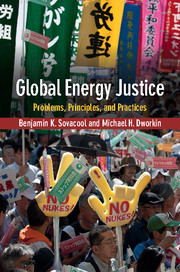Book contents
- Frontmatter
- Epigraph
- Dedication
- Contents
- Analytical table of contents
- List of figures
- List of tables
- Acknowledgements
- List of abbreviations
- 1 Introduction
- 2 The global energy system
- 3 Virtue and energy efficiency
- 4 Utility and energy externalities
- 5 Energy and human rights
- 6 Energy and due process
- 7 Energy poverty, access, and welfare
- 8 Energy subsidies and freedom
- 9 Energy resources and future generations
- 10 Fairness, responsibility, and climate change
- 11 The imperative of making just energy decisions
- Index
- References
1 - Introduction
Published online by Cambridge University Press: 05 October 2014
- Frontmatter
- Epigraph
- Dedication
- Contents
- Analytical table of contents
- List of figures
- List of tables
- Acknowledgements
- List of abbreviations
- 1 Introduction
- 2 The global energy system
- 3 Virtue and energy efficiency
- 4 Utility and energy externalities
- 5 Energy and human rights
- 6 Energy and due process
- 7 Energy poverty, access, and welfare
- 8 Energy subsidies and freedom
- 9 Energy resources and future generations
- 10 Fairness, responsibility, and climate change
- 11 The imperative of making just energy decisions
- Index
- References
Summary
Some may think that decisions about energy can be made on a purely technical or technological basis, without the need to be “distracted” by abstract questions of justice. We disagree, not only because typical controlling statutes for electric utilities require pursuit of outcomes that are “just and reasonable,” but also since in substance energy problems raise moral issues decisively and differentially affected by the outcomes of policy decisions. People are starting to recognize that the world of energy involves fundamental ethical questions. Thirty years ago, electrons, barrels of oil, and justice would have seemed like a jumble of topics, but now their combination makes sense.
Consider the following example. It is a quiet summer afternoon in Ohio, in the middle of a moderate, but hardly unique, warm spell. Imagine that you are sitting in the control room of the Ohio electric grid, in your third year on the job, feeling competent enough to be comfortable covering the shift while those around you go to get a sandwich or to work on maintenance routines. You look up at the “big-board” showing how much power is being carried by each major transmission line, how that compares to its design-limits, and how Ohio’s grid ties into the systems feeding the rest of northeastern North America. You know that you are responsible for a small, but vital, part of “the Eastern Interconnect” which serves 200 million people spread over a million square miles of the US and Canada.
- Type
- Chapter
- Information
- Global Energy JusticeProblems, Principles, and Practices, pp. 1 - 30Publisher: Cambridge University PressPrint publication year: 2014



